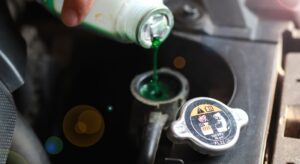The Benefits of Preventive Maintenance Tasks

Preventive maintenance tasks—such as replacing of parts, cleaning, lubrication and equipment repairs—offer you numerous benefits:
1. Minimized Downtime
Regular maintenance reduces the likelihood of unexpected breakdowns, minimizing costly downtime and keeping your car running smoothly
2. Increased Lifespan
Addressing potential issues early on allows you to extend the lifespan of your vehicles, maximizing your return on investment (ROI)
3. Enhanced Safety
A well-maintained car is safer to operate, reducing the risk of accidents and injuries to you or your employees
4. Improved Performance
Your car—thanks to preventive maintenance—can operate at peak performance levels, thereby optimizing efficiency
5. Cost Savings
A preventive maintenance strategy enables you to address minor issues promptly and prevent major breakdowns, allowing you to avoid expensive repairs and replacement costs.
Trust Our Products
For over 60 years, O’Neill Auto and Transmission service has been helping drivers across North America maintain their vehicles. With ASE-certified mechanics in all our stores, we can take care of all your auto repair and maintenance needs. We’ve got you covered from oil changes, filter replacements, and fluid flushes to brakes and brake repair, shocks and struts, muffler repair, tires, and wheel alignment.
Oil Change – More than You Wanted to Know
Engine Oil
Most cars on the road today use multi-grade motor oil—one that can work efficiently in cold and hot weather. A multi-grade oil is rated by two numbers, such as 5W-30.
About the Oil Classification System
Each engine oil comes with a classification indicating its viscosity, which is its friction or resistance to flow. In a multi-grade oil, the first number indicates how the oil will flow when it is cold. The lower the number, the lighter the oil will be, and the better it will perform at lower temperatures. The second number indicates the thickness of that same oil at high temperatures. For example, a 5W-30 oil will flow as a 5-weight oil at zero degrees Fahrenheit and as a 30-weight oil at 210 degrees Fahrenheit.
Why Viscosity is a Concern
When starting a cold engine, only a small amount of oil is present in its upper parts. To lessen the friction when upper engine parts, such as the valve train, pistons, overhead cam and cam bearings, scrub against each other, a lower viscosity allows the oil to reach the components more quickly.
Why 5W-30 and 5W-20 Oils are so Popular
Many vehicles today leave the factory with 5W-30 or 5w-20 engine oil. Vehicle manufacturers recommend them because they are lighter oils that perform well in a range of temperatures and help improve gas mileage.
Synthetic Oils
Not all motor engine oils are 100% petroleum. Synthetic oil—a man-made lubricant which consists of artificially made chemical compounds—are also available. Full synthetic oil provides:
- Higher viscosity stability over a wider temperature range
- Reduced oil thickening
- Reduced wear and increased load-carrying ability.
One of the major differences between synthetic motor oil and conventional is their origin. Full synthetic motor oils are engineered in a lab whereas conventional oils are refined from crude oil. Full synthetic oils deliver superior performance and protection when compared to conventional oil and synthetic blends.
Which Oil is Right for Your Car?
The simplest and safest way to find out is to check your owner’s manual…or talk to your mechanic.
Oil Filters
Oil filters are designed to trap foreign particles suspended in the oil and prevent them from getting to the engine bearings and other parts.
Fluids
Your vehicle relies on a variety of fluids to operate its brake, steering, transmission, engine cooling and other systems. When these fluids become degraded or are at incorrect levels, damage to other components may occur…so always follow the manufacturer-recommended service schedule.
Automatic Transmission Fluid
This is typically an oil-based fluid used in a transmission that lubricates and cools the transmission and provides hydraulic pressure to shift gears automatically.
Brake Fluid
This is the hydraulic fluid used to transmit pressure through the brake lines in a brake system providing stopping power and protecting hydraulic brake components from internal corrosion.
Coolant/Antifreeze
This is the mixture of water and antifreeze used in an engine cooling system to dissipate heat and maintain the engine’s temperature throughout its operating range.
Starting & Charging
The battery starts your car, powers onboard computers and supplies emergency power needs. A weakened battery causes stress on alternators and starters, especially during extreme temperatures. Let O’niell’s test and inspect your battery regularly.
Air Filters
Clean air filters can increase engine performance, boost fuel mileage and reduce engine wear. Cabin air filters can minimize airborne contaminants in the passenger compartment and improve heating/cooling efficiency.